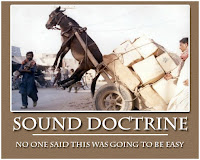 One of my first on-ramps into missional thinking was Reggie McNeal's book The Present Future - Six Tough Questions for the Church (http://www.amazon.com/Present-Future-Tough-Questions-Church/dp/0787965685). I was blown away by the candor and honesty of
One of my first on-ramps into missional thinking was Reggie McNeal's book The Present Future - Six Tough Questions for the Church (http://www.amazon.com/Present-Future-Tough-Questions-Church/dp/0787965685). I was blown away by the candor and honesty of of the questions McNeal was asking and found that they helped articulate my own
struggles and questions. Unlike many books being published around
the same time The Present Future was practical and helpful while being
challenging and provocative.
McNeal's new book, Missional Renaissance, is another fine example of a practical book that is as helpful as it is challenging and critical. The subtitle summarizes the guts of the book: Changing the Scorecard for the CHURCH. McNeal is attempting to provide new metrics for measuring church health. Personally, I believe this is the most important "next step" for the missional process to take. The missional concept is out there - people are aware of the missional dialog (much of which began with the emerging church dialog) - and there are several examples of churches wrestling with how to course correct in light what God is saying and doing through this powerful movement. Creating new measurements for the local church is critical if we are to hold the course and not fall back into old patterns which yield old outcomes.
One of the shifts McNeal proposes in his book is that the church move from destination to connector. "The church is a connector, linking people to the kingdom life that God has for them. When the church thinks it's the destination, it confuses the scorecard and keeps people away from their true destination - LIFE." I love this simple language and practical perspective. The church is not the end...it is a means to an end. Church leaders should figure out how to measure the end so that we understand the role and function of the church in achieving that larger outcome. What is it that matters MORE than the growth of our local church? Is there anything else more important?
Read this book.
If you are deep into the missional dialog you will appreciate Reggie's comprehensive look at the movement and the practical ways he seeks to create new metrics. If you are new to the conversation, I can't imagine a better book to help get you up to speed.

